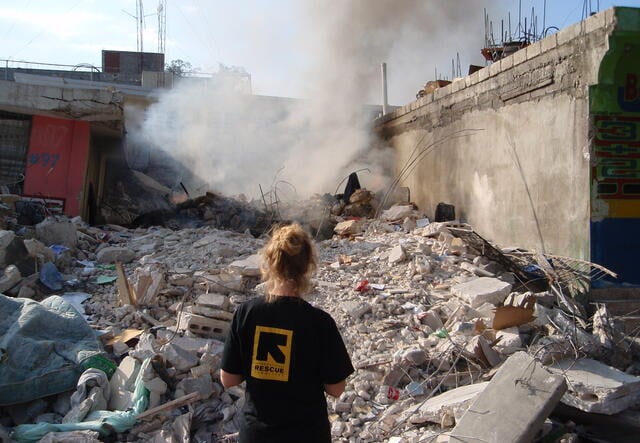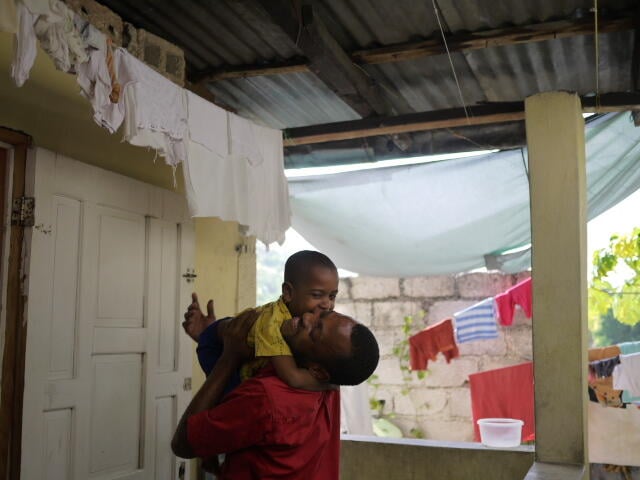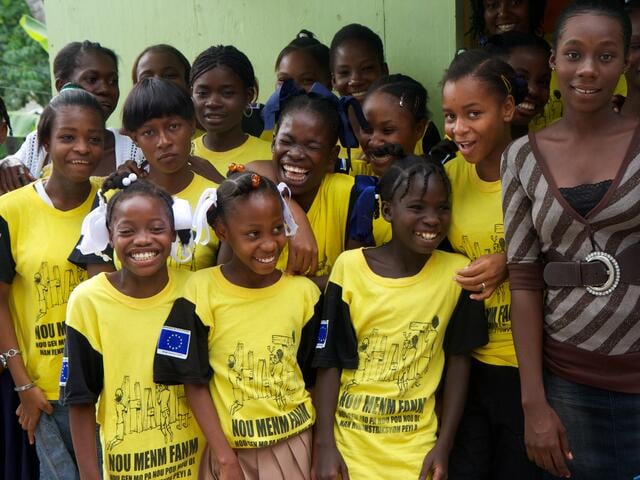
On Jan. 12, 2010, a massive 7.0 earthquake struck Haiti about 10 miles southwest of the capital, Port-au-Prince, killing 300,000 people and leaving 2.3 million homeless without clean water or food.
The damage was enormous and overwhelming. “Dead bodies were still being pulled from the rubble even as search and rescue teams worked feverishly to find anyone still living,” said the International Rescue Committee's emergency response director at the time, Gillian Dunn. “Earthquake survivors were gathering in parks and the sides of roads, setting up makeshift tents using bed sheets and rope.”

Emergency response
The IRC immediately responded by providing clean water and sanitation, critical to preventing disease. We also deployed experts who addressed the special needs of traumatised children and women and started economic recovery programmes.
“Dead bodies were still being pulled from the rubble even as search and rescue teams worked feverishly to find anyone still living.”

Reuniting families
Tens of thousands of children lost their parents to the earthquake. Many were separated from relatives in the chaos that followed.
The IRC went to work to reunite children with their families, collaborating with the Haitian government and a network of international and local organisations to find, identify and register separated children. We also trained Haitian social workers in family tracing and other tracking techniques.
“Tens of thousands of Haitian children are homeless, traumatised, disoriented and distressed, and those who have been separated from family members are especially vulnerable," said Rebecca Chandler, former child protection expert with the IRC emergency response team in Haiti.
To ensure separated children were safeguarded from exploitation and abuse, the IRC set up safe spaces with a range of healing, recreational and learning programmes. Since the disaster, the IRC has reunited more than 1,000 children in Haiti with their biological families, including 156 working in domestic servitude. We also worked with families and orphanages to combat trafficking through public education campaigns.
Combating diseases
With thousands of displaced families living in overcrowded and unhygienic settlements, it was no surprise when a serious outbreak of cholera infected thousands. The IRC swiftly launched prevention campaigns in 30 settlements in Port-au-Prince, and distributed soap, cleaning supplies, jerry cans, chlorine and water purification tablets for drinking water.
The IRC also rehabilitated water and sanitation systems at health clinics and youth centres and built latrines, showers and safe water points in the capital, the city of Leogane and surrounding areas.
People are literally living amid their own waste and there is a growing danger of epidemics," said Sam Gonzaga, environmental health coordinator who served with the IRC emergency response team in Haiti.
IRC-trained volunteers educated people on good health and disease-prevention practices such as effective hand-washing and hygienic food preparation.
The IRC is one of the few remaining aid agencies providing lifesaving sanitation and hygiene services for thousands still living in crowded camps near Port-au-Prince.
Dead bodies were still being pulled from the rubble even as search and rescue teams worked feverishly to find anyone still living.
Protecting women and girls
Women and girls were at the centre of the IRC’s earthquake relief effort. Many of the local organisations which provided support and protection to women and girls had been severely weakened. And in Haiti, as anywhere, violence increased dramatically during times of crisis.
The IRC provided psychosocial care, medical assistance and legal counselling to survivors of violence. We also distributed solar lights in dangerous areas to enhance safety and security and constructed private bathing stations to ensure privacy.
Economic recovery and livelihoods
The IRC helped put Haitians back to work rebuilding infrastructure in Port-au-Prince and Leogane through a cash-for-work programme. We provided technical expertise, tools, construction materials and other resources to workers, including women, who built permanent camp facilities.

Our impact at a glance
Within the first two years after the earthquake, the IRC:
- Reunited more than 1,000 children with their biological families
- Supported over 400 youth and families in their efforts to generate income.
- Employed 2,000 Haitians to help rebuild infrastructure.
- Trained more than 200 youth in business and life skills, and supported them with start-up grants.
- Trained over 200 teachers in 32 schools on education best practices, including how best to teach young children to read.
- Built 500 latrines, showers and safe water points.
- Administered vaccinations and doses of Vitamin A to 8,500 children.
- Educated over 130,000 people on how to prevent cholera and other diseases.
Our work today
The IRC closed its programme in Haiti in 2016, but continues to maintain a relationship with two permanent national organisations, FOSREF and FADHRIS, providing them with limited operational, technical and capacity enhancement support.